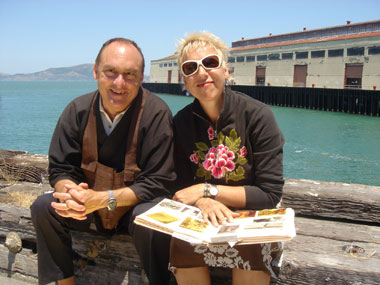|
|
|
|
Written & Directed by Doris Dorrie.
Produced by Franz X. Gernstl & Fidelis Mager.
Directors of Photography Jorg Jeshel & Doris Dorrie.
Edited by Suzi Giebler.
Released by Roadside Attractions.
Language: English & German with English subtitles.
Germany. 93 min. Rated PG-13.
American Zen priest Edward Espe Brown is no paragon of tranquility and calm. After nearly 40 years of practice, he still gets anxious before delivering a public speech, weeps when he doesn’t have the right sponge, and gets impatient enough in the kitchen to use language that earns Doris Dorrie’s bright and friendly documentary a PG-13 rating.
How to Cook Your Life moves along at a quick clip while Dorrie interviews dumpster divers, organic farmers, and other white Californians who view the mass production of food as alienating, psychically unpleasant, and socially irresponsible. The meaning of food and the dehumanizing disconnection from our source of food are central themes, yet Dorrie offers surprisingly little larger-world context – we visit Austria and California without much explanation of why – and we are plunged headlong into an intimate encounter with Brown as if we’re suddenly his students, talking Zen, learning to bake bread.
Another area with little background is Brown’s biography. We find out how long he has been practicing Zen, that he grew up on Pillsbury and Wonder Bread, and learned to bake at the Tassajara Zen Center when he was 19, leading to the publication of his book The Tassajara Bread Book. As someone obsessed with other people’s secrets, I wanted more. What is American Zen? How many practitioners are there? Do the priests marry? Do they have sex? We hear why Brown was drawn to baking, but not what else led him to Tassajara in the first place.
Still, Dorrie’s documentary is fun, and it does make you think about food – how and why we prepare it, where we get it, how it fits into our modern lives. It’s also a good introduction to the way that, as Brown says, “Zen finds poetry in everything.” Brown is highly flawed (he uses dented, taken-for-granted teakettles as a metaphor for himself – for perhaps every self – a thought that brings him to tears), down-to-earth, charming, funny, and easy to relate to. He’s certainly not holier-than-thou. The film, too, is lovely with all of its quirks and likely to inspire you to go home and bake bread, carefully, from scratch.
Dorrie (who, despite having written and directed several acclaimed features, is perhaps better known today as an author than as a filmmaker)
loves irony and uses it seductively. In one of her short stories, for example, a young woman mistranslates everything that her
boyfriend and mother say to each other, and then gets miffed because people never believe what she says. This Zen priest prone to weeping and rage,
who hacks off the plastic top of a bottle of olive oil out of frustration that he can’t pour the liquid out fast enough, is a typical Dorrie
character, all the more alluring because he’s real.
Elizabeth Bachner
November 16, 2007


